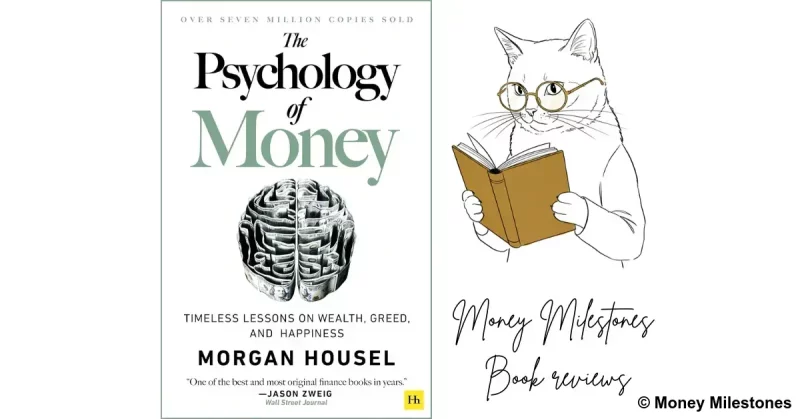Why I avoid stock picking and choose index funds instead
There are two main options for stock investing: picking individual stocks or investing in an index tracker. I personally avoid stock picking. In this article, I’ll explain why.
Picking stocks is also called active investing because either you, a fund manager, or an algorithm actively select one or a small set of companies to invest in. The second option is called passive investing because you do not pick individual companies. Instead, you buy shares in an index fund that tracks the performance of a large group of companies.
I believe that investing in individual stocks rather than stock indices is a major mistake for most investors. For this reason, I almost never invest in individual stocks myself. In this article, I will explain why. I will also cover some of the common arguments in favour of stock picking that I sometimes hear.
Disclaimer. This article is for information only and does not constitute financial advice. It is not a recommendation to buy or sell investments. Check the facts and consider independent financial advice tailored to your circumstances before you act.
What is Active investing?
Active investing is where you, or someone acting on your behalf, actively chooses which company or companies to invest in. How long you stay invested does not matter. What matters is that you, your fund manager, or the investing algorithm decide a particular company is worth investing in.
The opposite of active investing is when you do not pick individual companies (or a small set of companies) but instead invest in a stock index.
What is Passive investing?
Passive investing involves buying shares in an index fund. An index tracks the combined share value of a group of companies selected based on criteria such as location, industry, company size, and more.
Here are some examples of indices to illustrate the concept:
- FTSE 100: The 100 largest companies listed on the London Stock Exchange.
- S&P 500: 500 leading large-cap US companies listed on various stock exchanges.
- Dow Jones U.S. Health Care Index: A broad range of US healthcare companies.
There are typically hundreds of companies in any given index fund, with firms regularly entering and leaving the index. A company can (and often does) appear in multiple indices.
Active vs passive: the biggest difference
When you invest in a stock index, you buy shares in a large number of companies at once. Some will perform very well, some will do okay, and others may lose value over time. This lowers your potential returns because you would earn more if you only invested in the top-performing company instead of the whole group.
The problem is that predicting which companies will do well and which will struggle is very difficult. If you pick just one company, you might back a winner and achieve high returns, or you could back a loser and suffer significant losses. This is why active investing is much riskier than passive investing.
In other words, active investing carries higher risks, but the potential returns may be greater than with passive investing.
Now, let’s look at why I avoid stock picking.
Why I avoid stock picking: beating the market is very hard
The first reason I almost always avoid stock picking is that beating the market consistently over the long term is extremely difficult.
What does it mean to beat the market?
First, let’s clarify what it means to beat the market. Beating the market means earning more than the average returns of the relevant market. For example, if you buy shares in a FTSE 100 company and make a 10% profit in one year, but the FTSE 100 itself goes up by 12% that year, you have not beaten the market. You are actually worse off compared with the scenario where you bought shares in a FTSE 100 index fund.
This is a really important point: your baseline should be the average market returns, not simply whether you made a profit. With that in mind, why is it so hard to beat the market?
Stock investing is a zero-sum game
The answer is quite simple: stock investing is a zero-sum game. Any gain above the average market return corresponds to losses of similar magnitude for someone else. This is measured relative to the average return, so in this context, a “loss” might still mean you make money. But you would make less than if you had simply invested in the index instead.
At this point, you might be thinking: “If investing is a zero-sum game, then I have about a 50% chance of earning more than the average returns by picking stocks!”. Unfortunately, that is not the case.
Competition is really tough in stock investing
The reason is that you are competing against armies of traders and financial analysts. These are often highly skilled people who use sophisticated mathematical models to predict which stocks are likely to rise or fall. Banks and hedge funds spend billions of pounds refining these models every year. Let’s face it: their chances of getting it right are much higher than yours. Which means your probability of beating the market is much lower than 50%.
“What if I use a fund manager who picks stocks for me? Surely they know what they are doing!” you might be thinking. Even if that were true (which is highly debatable based on recent research), there is another big issue with active investing: it carries higher fees.
Why I avoid stock picking: active investing has higher fees
Whatever you invest in, you will have to pay fees. There’s nothing wrong with this. Investment platforms and banks incur costs and have salaries to pay. But this also means that stock investing is not even a zero-sum game: it’s a negative-sum game. Once you factor in fees, the aggregate losses are greater than the aggregate gains compared to the baseline market return.
The other reason this matters is that fees can differ hugely depending on whether you invest actively or passively.
Index fund fees are low
The fees you pay are typically much lower if you invest in an index fund compared to investing in individual stocks. Giving precise figures can be tricky because pricing is often opaque, with each provider using its own complex fee model. But let’s try anyway.
In the UK, index fund fees are usually around 0.1% to 0.25% of your investment value per year. For example, if you invested £75,000 in the Vanguard FTSE 100 Index, you would pay a total ongoing charge of 0.21% per year. If the value of your investment stayed the same, that would work out to about £158 per year.
Do-it-yourself active investing fees are higher
Let’s assume you are picking stocks yourself and investing £75,000 on interactive investor. You buy shares once a month (for example, when you get paid), sell shares once a quarter when you feel the market has shifted, and reinvest your dividends in shares once a quarter. In that scenario, you would pay around £212 per year in fees.
That might not seem like a big difference, but small differences in fees compound over time. It is also worth remembering that interactive investor is one of the cheapest platforms in the UK. If you use your high street bank, you will probably pay much more each year. And remember, you will pay those fees whether or not you beat the market or even turn a profit. This applies to both passive and active investing.
Active management fees are sky high
There is a final option you might be considering: paying someone to pick stocks for you. This can be done through high street banks, wealth managers, or active fund managers. They all have one thing in common. Their fees are extremely high.
According to a recent Financial Times article, the average fees for active funds are around seven times higher than those for trackers (another name for index funds). Typically, you can expect to pay more than 1% of the value of your investments each year in fees. Using our previous example, that would amount to £750 per year in fees, assuming the deal you get is not too egregious.
This means that even if the person you are paying beats the market, the gains may be partly or even fully erased by those fees. That’s another reason why I avoid stock picking.
Why I avoid stock picking: psychological biases
There is a final reason why I think picking stocks, either directly or through an intermediary, is a bad idea. This article is already quite long, so I will only touch on it briefly here. If you’re interested in this topic, I highly recommend reading The Psychology of Money, which I reviewed a few months ago.
Humans make suboptimal financial decisions because of psychological biases. We know that the first piece of information we read on a subject has a disproportionate impact on our decision-making. This is called the anchoring bias. We know that when other people do something, we tend to do the same. This is called the conformity bias. We also know that we hate losing more than we like winning, which is called loss aversion.
There are many more biases relevant to investing. These affect everyone, including finance professionals, causing repeated financial mistakes. Of course, they also influence us if we invest in index funds, but because the number of decisions is much lower than with active investing, the negative impact is significantly reduced.
Arguments in favour of stock picking
There are a number of arguments in favour of picking stocks instead of investing in an index fund that I hear regularly. Let’s now see whether these are good arguments or not.
“I can beat the market! I believe in company ABC”
Based on everything I’ve said so far, my opinion on this argument should be easy to predict: I think it’s a terrible argument. Unless you have access to non-publicly disclosed information (which would be insider trading and is illegal), you know exactly as much about company ABC as everyone else. And as we’ve seen above, statistically, your chances of getting it right are low.
“I want to support company ABC”
This argument is straightforward, but I don’t find it very convincing. When you buy shares on an investment platform, you don’t give money directly to the company. Instead, your money goes to another investor, the platform, and possibly several intermediaries. Technically, buying a share does not help the company directly (in most cases).
That said, it can help the company indirectly. When you buy a share, it supports the company’s market capitalisation, which can make it easier for the company to raise money in the future. But unless you manage a sovereign wealth fund with billions of pounds to invest, the effect is minuscule.
You might also try to convince hordes of other investors to do exactly the same and buy lots of shares in your favourite company. However, if you succeed, this could be seen by regulators as market manipulation, which is punishable by up to 10 years in prison in the UK. So, maybe it’s best not to try.
In my opinion, there are much better ways to support a company, such as buying their products or purchasing their bonds.
“I don’t want to support company ABC”
I also hear the reverse argument quite often. When you invest in an index tracker, you effectively buy shares in all the companies tracked by that index. Through the same mechanism as before, you help those companies indirectly.
The effect is even more minuscule in this case, because your investment is spread across hundreds of companies. But if you really don’t want to support certain companies or industries, you simply cannot invest in an index tracker that includes them.
Is this a strong argument against passive investing? Not really. There are hundreds of thousands of index trackers out there, so you are almost guaranteed to find one that suits your preferences. For example, if you want to invest in an S&P 500 index tracker but don’t want to finance the tobacco industry, there is an index tracker for that: the S&P 500 ex-Tobacco Index. The same goes for the gambling industry, the alcohol industry, the fossil fuel industry, and many more.
“My company is offering a share scheme”
Some companies offer share schemes to their employees as part of their compensation package. These schemes can take various forms, such as free shares, discounted shares, buy-one-get-one-free schemes, and more.
In my opinion, this is the only situation where it can make sense to buy individual shares. For example, if your company offers you a free share for every share you buy, they are essentially doubling your investment. Your company would have to crash very badly for you not to beat the market in that case.
However, whether share schemes are worth it or not really depends on the small print. For example, shares typically vest after a certain period, usually between two and five years. If you resign before then, you effectively forfeit your shares.
Another important point to keep in mind in this scenario is insider trading. This can occur if someone has access to non-public information, such as unpublished financial results or overheard conversations about the company’s performance. Using such information to buy or sell shares constitutes insider trading and is punishable by up to 10 years in prison in the UK.
As a side note, another important part of a company’s compensation package is their workplace pension. If you’re considering workplace benefits and retirement planning, you might also find my article on opting out of your workplace pension: smart move or costly mistake? useful.
Wrapping up: why I avoid stock picking
Now you know why I almost never invest in individual stocks, unless the company I work at offers an interesting share scheme. It is certainly not impossible to beat the market, but investing in a tracker (also called an index fund) is statistically the best strategy.
I’ve saved a mind-blowing statistic for the end. Over a 20-year period, almost 90% of active funds in the US produced lower returns than a simple index fund.
Let that sink in: 90% of finance professionals who are paid (very well, for that matter) to research and select the best companies to invest in did worse than an index fund. And it’s not just in the US or over the past 20 years. Warren Buffett famously wrote in a 1993 letter to shareholders:
By periodically investing in an index fund, for example, the know-nothing investor can actually outperform most investment professionals.
This is, in essence, why I avoid stock picking.
If you enjoyed this article, make sure to explore my other posts on personal finance, such as how to negotiate a pay rise or the biggest financial mistakes I made in my 20s. You can also try out some of the free tools on my website, like my emergency fund calculator, my savings and investments growth calculator, or my credit card debt optimiser.







